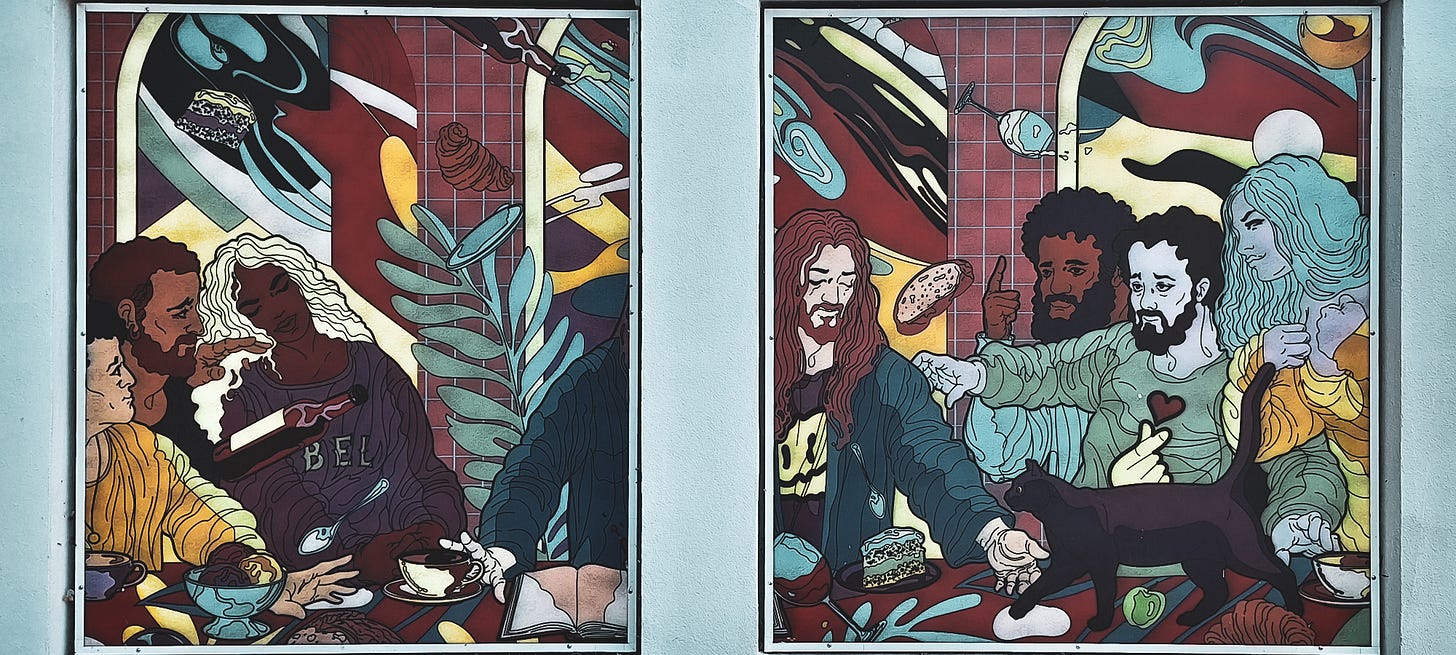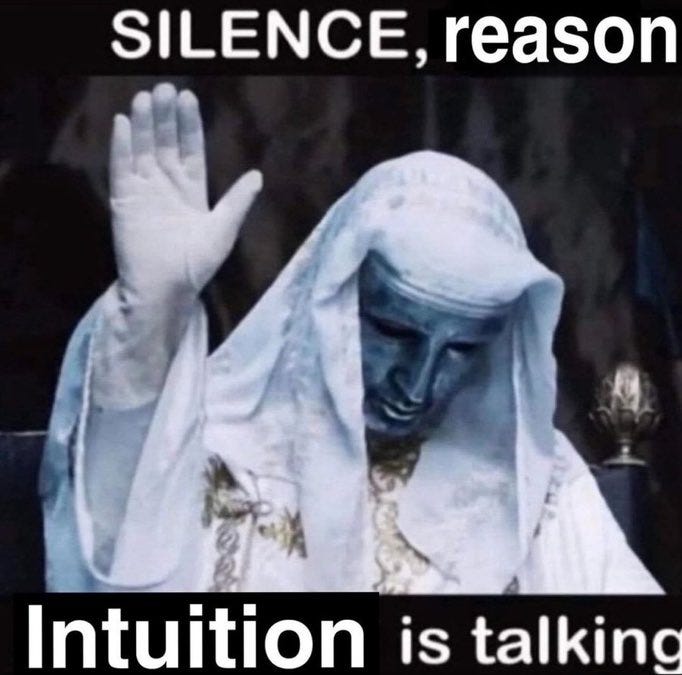dinner parties in Narnia, or America, or home: June 2024 Essay Recommendations
Loving our countries correctly, breaking barriers while breaking language, the real threat from AI, and more in this month's recommended longforms
Good afternoon July! Last month, I didn’t read as much or as broadly as I usually do, so here’s more of a what I read instead of a best of what I read kinda post.
call me Narnian-American
Well, after Thursday night’s U.S. presidential debate, lots of people (including Americans) are looking sideways at America. I’d be looking sideways too if, earlier this month, I hadn’t read
’s essay On Narnia. In it, she explores the love C.S. Lewis expressed for England via the Narniad and other stories. Lewis, she writes, loved England in a way that both rose above and bled far deeper than mere patriotism or national identity.If England’s national character is to be preserved, alongside her folk ways and folk wisdom, it is not because she has been an Empire but because she remembers (or, at least, Lewis quixotically hopes she remembers) what it means to be a village. Nobody, in Narnia, fights for glory, or for grandeur, or for Greatness. They fight for Narnia—and they fight for each other. They fight so that they can go home and sleep in warm beds and eat food far more wholesome than any boarding school will ever serve.
If you don’t read anything else I recommend today, please do read this one. There’s so much richness here that it inspired me to write something applying a similar logic to the present American milieu and electoral conundrum. That should be out and about in a few days; I’ll post it here.
reversing Babel
I’m not sure I agree with Dan Brooks’ view that the universal adoption of slang is a net loss for the world, but it’s a fascinating concept. The internet and social media, he writes, have made slang terminology, previously a unique identifier of specific people groups, universal—hence destroying slang’s usefulness in allowing us to quickly determine which (ethnic, cultural, gendered, generational) groups other people belong to. This creates the illusion that because we speak the same “language,” we have the same worldview.
This mass outbreak of exformation-free slang is a problem because it deprives people of a previously reliable way to know whom they’re talking with and how to treat them… When everyone talks like me, I make the mistake of believing that everyone is like me—and therefore falls into the category of people whom I cut the least slack.
Yeaaaah, not sure that’s the conclusion one should draw, but I’d love to see more chatter about this. Preferably without the use of slang. Read: Social Media Broke Slang. Now We All Speak Phone.
While we’re on the topic of developing expressions of language, two seemingly unrelated pieces:
Will Gordon explores perspectives from Neil Postman, E.D. Hirsch Jr., and Allan Bloom on how children might best learn ways to determine meaning —> Do Students Need Facts or Stories?
Spencer Kornhaber examines the latest trends in girl pop led by Sabrina Carpenter, Chappell Roan, and Charli XCX. Apparently, their new music is the “sound of young women cracking jokes with one another against a backdrop of growing alienation between the genders.” Ach. —> The ‘Espresso’ Theory of Gender Relations
you’re invited
As someone who has deliberately given attention to building and investing in community over the past few years, I appreciated on the dinner party by
. I agree: the dinner party is a dying form of community artistry that should be revived.Hospitality, conviviality, attention: of these, it is attention that is in shortest supply in our lives. So, if the dinner party really has declined, I submit we should look for the explanation here.
When we socialize, we prefer to do it on our own terms, as with most other activities in modern life. A dinner party, meanwhile, calls us away from ourselves – and from the other demands of life, including those that intrude via the rectangular screens in our pockets and purses.
deus ex machina @ the end of AI
We’ll continue to be up in arms for however long it takes the AI bubble to burst or for it to evolve into a demanding, irresistible, all-encompassing force. Something like the latter is more likely, and
explains why in his Plough piece, Tech Cities of the Bible. Mankind, it seems, has an inclination for employing every pioneering technology to secure its own present and future and deify those who inspire others to labor to such ends. Those technologies—whether the metal and musical instruments of Cain’s descendants, the brick-firing capabilities that built Babel, or the legal binding made possible by that first technology, the word—have an equal tendency to effect a kind of enslavement over its creators and bring about their destruction.The capacity of the word to turn against its supposed master is a biblical warning against the dangers of humanity’s overweening ambitions for autonomous dominion. Unlike the divine Word, who is always with the Father and in whom the Father always dwells, the “words” by which people seek to fashion and control their worlds can escape and betray them. Seen biblically, the role of legal and technological structures in the rebellious systems that people invent – parodies of the creation mandate – should caution us: the words and works of creatures striving for a rebellious autonomy have their own tendencies to autonomy and can imprison those who supposed themselves to be their masters. Make an idol – political or technological – and it will turn on you.
Some folks certainly seem to be making an idol of AI, and as Charlie Warzel argues in The Atlantic, AI could very well eat the world.
my spirit-animal Substack post
This post—research as leisure activity—by
made me feel seen because a recurring thought in my writing experience has been that an assemblage of insights from numerous unrelated disciplines does not a real essay (or work of art) make, despite this being the primary method by which my writing comes about. This type of “research” has always felt unorthodox and a bit illegitimate. Yet I enjoy it immensely.Nguyen defends the act of research as valuable not just for rigorous output but for personal enjoyment and amateur artistic production. “It’s not about the formal credentials,” she writes. “It’s fundamentally about play.” She describes “a life where it’s just fun to be reading, learning, writing, and collaborating on ideas.”
Research as leisure activity is directed by passions and instincts. It’s fundamentally very personal: What are you interested in now?
Who is doing this kind of research as leisure activity? Artists, often.
I’d also say that pretty much every writer, essayist, “cultural critic,” etc—especially someone who’s writing more as a vocation than a profession—has research as their leisure activity. What they do for pleasure (reading books, seeing films, listening to music) shades naturally and inevitably into what they want to write about, and the things they consume for leisure end up incorporated into some written work.
Yes, yes, yes!
Two more items of note…
- ’s interview with Lisa Victoria Fields about her soon-to-be-released book, When Faith Disappoints: The Gap Between What We Believe and What We Experience. Fields promotes an incarnational apologetic which requires believers “to be the embodiment of the message.”
Elizabeth Bruenig takes the recent Donald Trump guilty verdict and converts into a conversation about criminal justice reform as only she can.
Currently…
📺 Watching: Agents of S.H.I.E.L.D. A leisurely rewatch because I can’t be bothered at the moment with anything new.
🎧 Listening: New albums by Crowder (The Exile) and LAUREL (PALPITATIONS). Enjoying them immensely.
📖 Reading: Man’s Search for Meaning and every journal article known to man.
🔎 Exploring: roadkill, short stories, and pilgrimage
Programming update. Starting July 15ish, I’ll be taking a break from writing new VPSS posts until September 15ish. Gotta focus on some other things, including my master’s thesis and vacation time. However, there will be new writing from me in other places between now and then. So, stay tuned!








